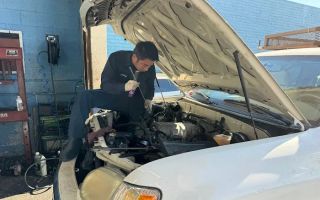How to Fix a Flat Tire with an Air Compressor
As a car owner, dealing with a flat tire can be one of the most inconvenient and frustrating situations, especially when you're on the road, far from help. I still remember the first time I experienced a flat tire in the middle of a long road trip. My heart sank as I realized I was miles from the nearest service station, but thankfully, I had an air compressor with me. In this article, I’ll walk you through how to fix a flat tire with an air compressor, providing tips and tricks to make sure you can handle this situation on your own.

MR. TIRE INC.
2078 New York Ave, Huntington Station, NY 11746, USA
1. What You Need to Fix a Flat Tire
The first thing I learned is that having the right tools can make all the difference when dealing with a flat tire. With a good air compressor, you can often avoid calling for a tow truck or waiting for roadside assistance. Here’s what you’ll need:
- Air Compressor: A portable air compressor is compact, easy to store, and can quickly inflate your tire. Some models run off the car battery, while others have a rechargeable battery or plug into a 110V outlet.
- Pressure Gauge: An air pressure gauge will help you ensure your tire is inflated to the manufacturer’s recommended pressure. It’s essential for accurate and safe inflation.
- Sealant (Optional): If you have a small puncture, a tire repair sealant may help temporarily fix the issue. This can be particularly helpful when there’s no visible hole or if you don’t want to change the tire on the spot.
- Jack and Lug Wrench: While an air compressor can help inflate the tire, you may still need to lift the car and remove the flat. A jack and lug wrench will be needed for this step if you need to replace the tire entirely.
Having these items in your car can save you time and money in the event of a flat tire. I can’t stress enough how important it is to have an air compressor and a set of tools readily available, especially if you’re frequently on the road.

MR. TIRE INC.
2078 New York Ave, Huntington Station, NY 11746, USA
2. Step-by-Step Guide: Fixing a Flat Tire with an Air Compressor
Now that we have the tools, let’s go through the step-by-step process of fixing your flat tire using an air compressor. This process is relatively straightforward, but following each step carefully is crucial for safety and effectiveness.
2.1 Check the Tire Condition
The first thing I always do is inspect the flat tire. If there is a visible puncture (like a nail or screw embedded in the tread), a temporary fix with an air compressor and tire sealant might be possible. However, if the tire is severely damaged or if the sidewall is compromised, it’s best to replace the tire entirely. Don’t take chances if the tire looks beyond repair, as continuing to drive on it could lead to more damage or even an accident.
2.2 Prepare the Air Compressor
Next, I ensure that my air compressor is ready to use. I plug it into my car’s power outlet or make sure it’s charged if it’s a portable model. Some compressors come with built-in pressure gauges, while others may require a separate gauge. It’s also essential to check the power level of your air compressor to ensure it will last long enough to fully inflate the tire.
2.3 Remove the Valve Cap and Attach the Air Compressor
Once the compressor is ready, I remove the valve cap from the flat tire’s valve stem. Be sure to store the cap in a safe place, as you’ll need to replace it once the tire is inflated. Next, I attach the nozzle from the air compressor to the valve stem, ensuring that it’s secured tightly to avoid air leakage.
2.4 Inflate the Tire
Now comes the most straightforward part: inflating the tire. I turn on the air compressor, and it starts pumping air into the tire. During this process, I keep a close eye on the tire’s pressure using the built-in gauge or a separate pressure gauge. Most cars will have a recommended tire pressure listed on a sticker inside the driver’s side door frame. For standard tires, the pressure should usually be between 30 and 35 PSI, but you should always check your owner’s manual for specifics.
As the tire inflates, I periodically stop and check the pressure to ensure I don’t overinflate it. If you don’t have a gauge, I recommend stopping every couple of minutes to measure the pressure manually and avoid any issues.
2.5 Use Tire Sealant (If Necessary)
If the tire has a small puncture, I sometimes use a tire sealant to help seal the hole temporarily. I attach the sealant can to the valve stem and activate it to inject the sealant into the tire. Once done, I use the air compressor to finish inflating the tire. The sealant will help plug the puncture, but it’s important to get the tire fully repaired as soon as possible.
2.6 Recheck the Tire Pressure
After the tire is fully inflated, I recheck the pressure to ensure it’s within the recommended range. If it’s correct, I detach the air compressor nozzle and replace the valve cap. It’s important not to drive with an improperly inflated tire, as it can lead to uneven tire wear and handling issues.
3. What If the Tire Still Won’t Inflate?
On one occasion, I encountered a situation where the tire just wouldn’t inflate. After trying the air compressor, I noticed that the sealant didn’t work and the tire was still losing air. This was an indication of a larger problem—such as a bigger puncture or internal damage to the tire. In this case, it was best to call for professional help.
If this happens to you, and you can’t get the tire inflated, consider calling a towing service like Rescue & Towing. They offer roadside assistance and can come to your location to either repair or replace the tire, saving you time and effort.
4. Preventing Flat Tires in the Future
Once I successfully fixed my flat tire, I knew it was important to take steps to prevent future flat tire issues. Here are a few tips based on my experience:
4.1 Regularly Check Tire Pressure
It’s a good habit to check your tire pressure regularly. Low tire pressure can lead to premature wear and increase the likelihood of a blowout. I now check my tires monthly, especially before long road trips.
4.2 Inspect Tires for Damage
Before heading out, I always inspect my tires for any visible punctures, cracks, or bulges. This can help catch issues early and prevent bigger problems down the road.
4.3 Keep a Tire Repair Kit Handy
I also recommend keeping a tire repair kit with an air compressor in your car. It’s a small investment that could save you a lot of time and stress in the future. Plus, knowing how to fix a flat tire yourself can be incredibly empowering, especially when you're stuck in a remote location.
For peace of mind, consider signing up for a roadside assistance plan. Many services, including Rescue & Towing, offer affordable packages that provide 24/7 assistance in case of emergencies, such as flat tires, breakdowns, and more.























